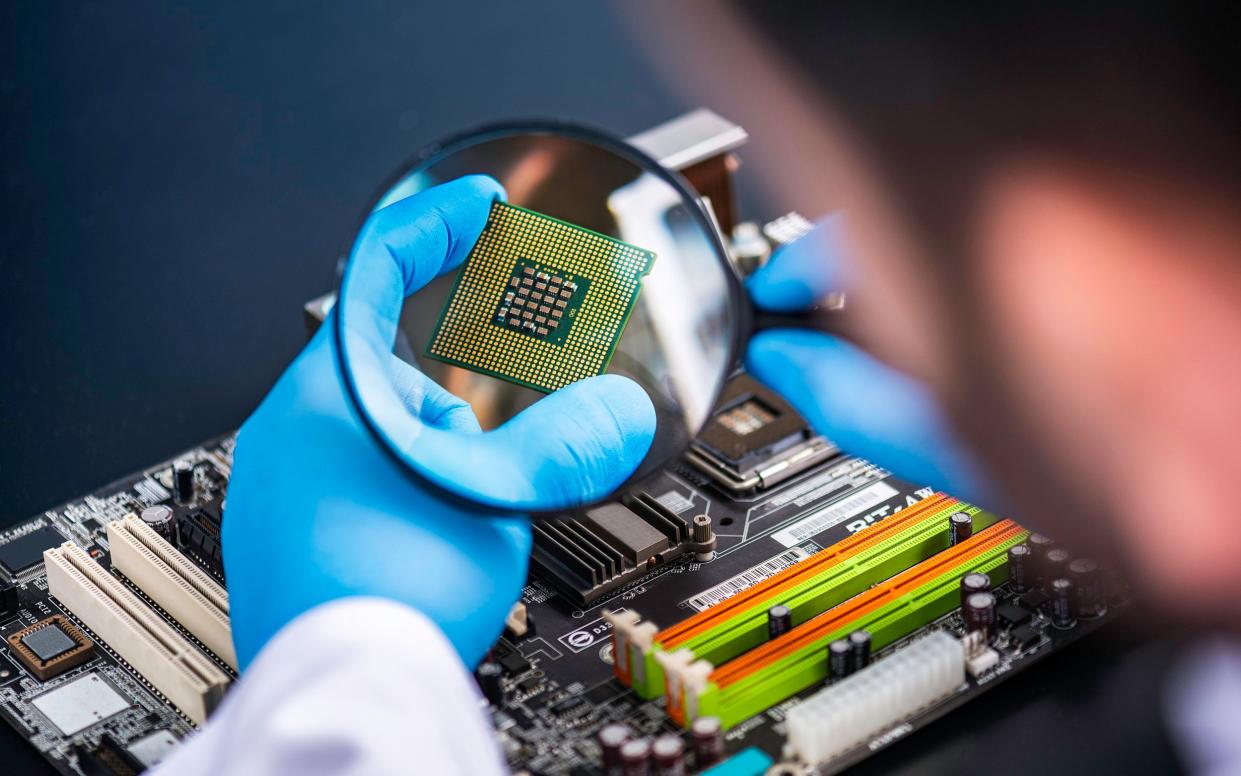Don’t be fooled – no one can predict the profitability of the AI boom

The realm of artificial intelligence (AI) has easily become one of the most prominent investment themes of 2024, with global stock markets recording their best first-quarter performance in five years amid a wave of enthusiasm for US tech stocks.
Investors have been piling into major tech stocks such as Nvidia, causing it to surge 88pc so far this year and pushing its market value to a record-breaking $2.3 trillion (£1.8 trillion).
The recent tech rally is in part due to strong financial results for Silicon Valley behemoths such as Facebook owner Meta, which announced in February that it will pay up to $50bn to shareholders after reporting record revenues and a steep 200pc rise in profits.
Some are even saying that today’s tech giants could start to rival long-established oil and pharmaceutical conglomerates for the vast amount of money they generate shareholders.
What’s more, some investment trusts have more than a fifth of their money in the Magnificent Seven US tech stars such as Nvidia, Amazon and Microsoft and the trusts with the highest exposure have tended to outperform over the past year.
This is thanks to a doubling in the cumulative value of the seven stocks. For example, the JPMorgan Global Growth & Income fund had 20.7pc of net assets in the Magnificent Seven at the end of January.
Lest we forget, deputy prime minister Oliver Dowden once expressed that AI will have greater effects on society than the Industrial Revolution.
But what is it about the AI boom that has everyone talking? AI is defined by machine learning processes whereby algorithms that learn to generate text, images, video and code use data and prior programming to create outputs.
Generative AI, for instance, sees services like ChatGPT producing near-human responses to simple prompts via the cutting-edge language model GPT-3, which can result in efficiency gains and productivity growth through the automation of tasks or cost reductions.
However, 65pc of British respondents in a survey by Ipsos have stated that products and services using AI make them nervous. Notably, growth in US stock markets has outstripped the UK’s, with the benchmark FTSE 100 lagging behind with growth of just 3pc in the year so far.
Yet, many British investors remain interested in identifying areas of potential within this cutting-edge technology.
Is it worth putting money into companies employing artificial intelligence? ChatGPT in specific is not publicly traded so investors cannot currently buy shares in the company since its developer OpenAI is registered as a private corporation.
Instead, this has led to investor focus on alternative AI services such as Berkshire Grey, whose share price rose 103pc last year.
Perhaps investors who position themselves where the most hopeful AI opportunities lie, such as with companies developing the infrastructure that powers AI or lesser well-known semiconductor and technology firms, may be better off.
An example of the former being the Netherlands’ ASML, a manufacturer of the lithography machines used to make advanced microchips. Its shares returned 445pc in sterling terms over the past five years. Micron Technology is an example of the latter – its dynamic random access memory (DRAM) revenue rose by over 50pc in the fourth quarter of last year.
While Nvidia, the world’s leading Graphic Processing Unit (GPU) producer which has pioneered accelerated computing, appears to be a solid long-term investment given its dominance over the GPU market, it is more “expensive” on a price-to-earnings (p/e) ratio.
Other options include broader technology-focused funds such as Allianz Technology Trust, Pictet Robotics and Polar Capital Global Technology which are invested in more than just the mega-caps. The Polar Capital Global Technology fund, for instance, is exposed to Broadcom, a global software leader that develops and supplies semiconductor and infrastructure solutions.
In any case, complementing existing exposure to mega-cap technology companies with allocations to other companies is an important method of portfolio diversification.
On another note, with tech companies like Meta increasing their dividends to shareholders as revenues surge, this cash has the potential to drive the whole market upwards since some of it can find its way back into other equities. It means that cash that would have otherwise been sitting on a Meta balance sheet, for example, can be deployed elsewhere.
Overall, the AI boom and wider adoption of new frontier technology will be driven by more than just growth in the stock market, which has rebounded from earlier share price falls. In fact, such monumental changes take place over many years, unlike the stock market, which focuses on earnings between three and 30 months away.
Despite strong investor confidence, no one can accurately predict the AI stock winners, especially as many companies are still in the process of developing their technologies so it’s not possible to identify long-term profitability off the bat.
The most compelling options will probably be the tech companies that rely on highly sophisticated software, those that provide real-world AI benefits and the firms that own large amounts of proprietary data.
Recommended
AI could revolutionise healthcare – here's how to cash in


